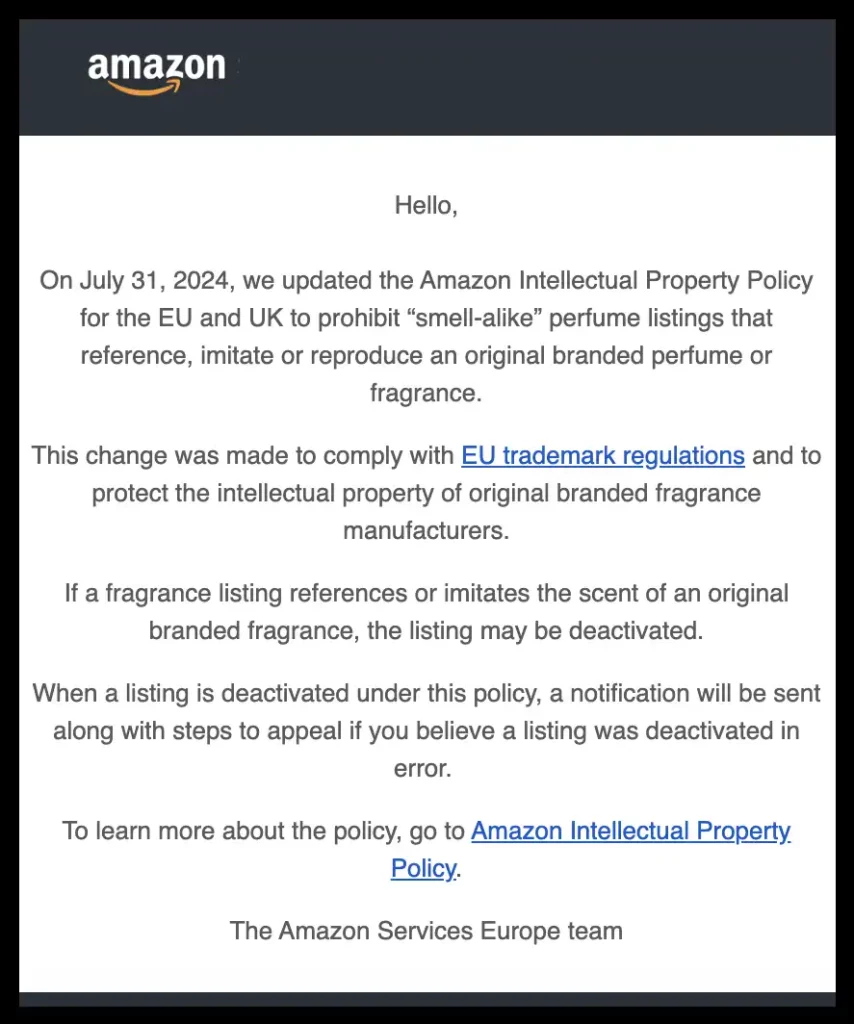Amazon’s Fragrance Policy Shake-Up
In an email sent out to retailers, Amazon has unleashed a seismic shift in the fragrance world, announcing a ban on “smell-alike” perfumes across its EU and UK platforms.
While it officially went “live” on July 31st, this groundbreaking policy change is now being enforced, effective immediately – specifically targeting fragrances that reference, imitate, or reproduce original branded perfumes.
The new policy, detailed in Amazon’s Intellectual Property Policy update, prohibits listings that attempt to piggyback on the reputation of established fragrance brands. This means that sellers can no longer use phrases like “smells similar to” or “our version of” when describing their products.
The move is set to reshape the landscape of fragrance sales on one of the world’s largest e-commerce platforms.
Amazon’s decision comes as a response to growing concerns over intellectual property rights in the fragrance industry. With the rise of clone houses and budget perfumers offering “dupes” of popular scents, luxury brands have been pushing for stricter regulations to protect their creations.
This policy change marks a significant victory for these established brands and could potentially set a precedent for other online marketplaces.

Glooshi was given access to the email sent to sellers.
The End of “Inspired By” Marketing?
The e-commerce giant cites compliance with EU trademark regulations and the protection of intellectual property rights as the driving forces behind this decision.
But make no mistake—this isn’t a blanket ban on alternative or budget fragrances. Rather, it’s a targeted strike against a specific marketing tactic that has long been a staple in the fragrance industry.
For years, you’ve likely encountered listings boasting claims like “Inspired by [insert designer brand name here]” or “Smells like [popular perfume].” These familiar phrases have served as beacons for budget-conscious fragrance enthusiasts seeking affordable alternatives to high-end scents.
Now, on Amazon’s platform at least, those days are coming to an end (although they are letting retailers appeal).
It’s crucial to understand that these alternative fragrances aren’t being banned outright. They can still be sold on the platform—they just can’t be marketed as “dupes” or “smell-alikes” of designer scents. This subtle but significant distinction marks the end of the “piggybacking” marketing tactic that many clone houses and budget perfumers have relied on.
The Impact on the Fragrance Industry
This policy shift sends ripples through every corner of the fragrance market. For clone houses and budget perfumers, it’s nothing short of a marketing earthquake. These businesses have long relied on riding the coattails off the reputation of established designer brands to attract customers. Now, they’re faced with the daunting task of completely overhauling their marketing strategies.
But what does this mean for you, the fragrance aficionado? At first glance, it might seem like your options are shrinking. However, the reality is quite different. You’ll still have access to a wide range of affordable fragrances—they’ll just be presented differently (but let’s be real, they’ll be much harder to find now that sellers can’t target popular dupe/clone keywords).
Without the crutch of designer comparisons, perfumers might be motivated to create more original scents. You could see an influx of unique, affordable fragrances that stand on their own rather than attempting to mimic established brands. Your fragrance journey might become more adventurous as you explore scents based on their own merits rather than their similarity to designer perfumes.
For established fragrance houses, Amazon’s decision comes as a welcome reprieve. The constant flood of “inspired-by” alternatives has long been a thorn in their side, potentially diluting their brand identity and eating into their market share. With this new policy in place, they may feel more secure in their position and potentially more willing to invest in new, groundbreaking scents – that’s obviously a win for those of us who appreciate innovation in fragrance.
A New Landscape for Fragrance Shopping?
It may be time to get back to basics when it comes to shopping for fragrance. Without relying solely on comparisons to designer scents, could this be the opportunity to train your nose, explore new scent combinations, and perhaps discover your next signature fragrance in unexpected places?
As for brands.. we think this change will likely spark innovation in the budget fragrance sector. Without the ability to market based on similarities to designer scents, perfumers might focus more on creating unique, compelling fragrances that stand on their own merits. You as a consumer might start seeing more detailed descriptions of fragrance notes, creative naming conventions, or emphasis on the quality of ingredients used.
Or there’s the elephant in the room, you could just go elsewhere for your dupes/clones – this policy is specific to Amazon’s EU and UK platforms. If you’re determined to find those “smells like” fragrances, you might still be able to locate them on other online marketplaces or in physical stores!
Let’s be real for a second.. this isn’t going to kill the clone market; it’ll just go elsewhere – the world of fragrance is ever-evolving, and this latest change is just another chapter in its rich history. While the familiar “inspired-by” marketing may be fading from Amazon’s pages, the essence of what makes a great fragrance – its ability to captivate, transform, and express – remains unchanged.

